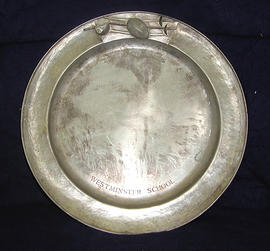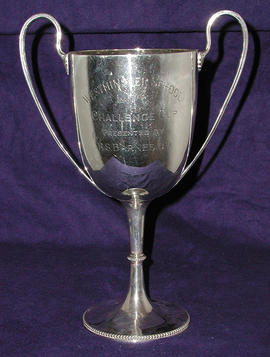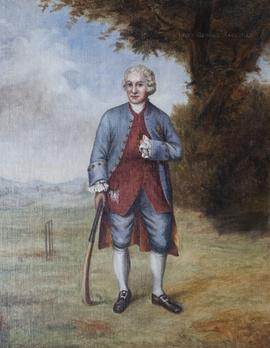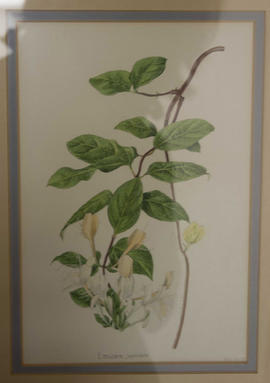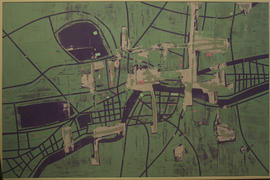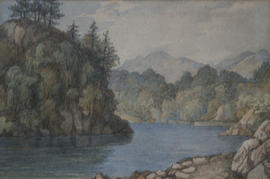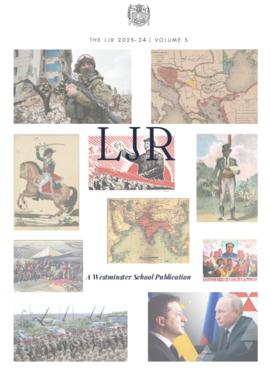Inscription: 'Maitre d'Armes Westminster School'. Plate with swords decoration. Presented by Doniert MacFarlane Ashburnham 1986-1991. Damage to hilt on sword decoration.
Born in Jamaica parents from Barbados moved to England in 1976 when her father came to London to be a medical advisor. Went to school and lived in England before moving to America [00:50]. Joined Westminster, her mother suggested her to apply, found the entry exam interesting and felt deep sense of curiosity [3:30]. Interest in medicine came most likely from her father, thought of Westminster as an intellectual academic coming of age, curiosity driven [6:15]. John Rae, headmaster at the time, made her Head of School. John Rae wanted Westminster to be seen as progressive, and to change the perception of public schools, so by selecting a black female student as Head of School, he was able to pursue this wish. Felt that this was quite well accepted by people inside the school, controversy outside of the school [8:55]. Felt connected to politics and arts by it being at school in central London [12:15]. Westminster created fearlessness, empowered choices and motivated risks and confidence [12:33]. Memory, when John Rae left people threw toilet paper to celebrate and say thank you, done with the nicest spirits. The quiet times as a boarder was tranquil. Boarded in Liddell’s. Thinking of her daughter applying to Westminster [16:28]. Was offered a place at Harvard as an academic and was there as a junior faculty member. Is still there now. The Gates Foundation wanted to build vaccine team, would allow potential influence on public health and health equity which spoke to her roots from a developing country. Helped create MRNA vaccine [19:33]. Supports large efforts in antibody and vaccine discovery and development, makes investments in companies and academics. During the pandemic, had resources that could develop Covid vaccine. Focus on ensuring the vaccine was available for lower/middle income countries, vaccine nationalism made this hard. Hopes to help the marginalised where problems are most inequitable [23:58]. Enjoys outdoor activities. Played Netball at Westminster and was captain. Also played Netball at Cambridge. Played lots of sports, most were sporty at Westminster. The food at Westminster was not great [26:45]. Traditions, champagne breakfast on people’s birthdays. The Christmas carols, assembly in the Abbey was extraordinary and a privilege. Not particularly close with friends from Westminster now due to leaving London [29:11]. Being a girl in the sixth form, only 15 girls in the year, unified in this way, very close. Maturity levels and seeming older than the boys in the year. Now about 60/70 girls that join in sixth form. Race, a lot of friends were Asian, very few Black people. Context of society at the time, found that Westminster was more progressive and did not impact her in negative way. Very happy at Westminster, intellectually interesting, peers very smart and forward thinking. Started as day girl and decided to board in first term [36:45]. Double maths, physics and chemistry at A-level. Diversity at Westminster, not just race and gender but thinking also. Diversity is embraced and cultivates a culture of acceptance [48:34].
Inscription: 'LTC Challenge Cup' and engraved with winner's names and dates. Presented by R.S. Barnes (OW). Handles. Not loaded. No cover. Awarded: 1951-1961. Small dent.
Atkin BrothersHead and shoulders, turned to the left; he wears a scholars' dress with white bow tie, and pink carnation, green background. P.L.M Sherwood was Captain of the King's Scholars in 1958.
Lambe, Philip Agnew, 1897-1968[00:20] First impressions of Westminster School. [00:38] Masters very nice. Challenge anecdote. [01:09] Day boy in Ashburnham. [01:58] Lushington as form tutor. [02:12] Leaving to have operation. Away for a long time. [02:50] Couldn’t play football. Lots of swimming instead. [03:10] Commute from Putney. [03:30] Masters. John Morton Wilson. Latin prose. [04:30] Enjoyed science. [05:04] Cyril John Crumpler, science Master. Mr Foxcroft. [05:35] Another pupil by the name of Hunt, connecting water tap to gas tap. Fire brigade called. [06:18] Experiments. [06:30] False roof up school. Latin prayers. [07:07] Walter Hamilton. Greek. [07:48] Joined the Corps. War still felt close. [08:10] Mr Brock, housemaster of Ashburnham. Telling stories of war. [08:50] Demonstrations at Hyde Park Corner on Sundays. [09:05] Art teacher. Mr Spore. Wanted to talk about naval history. [09:42] Francis Rause, housemaster of Busby’s. Major in war. Told stories, told back to him in House play at the end of term. [11:10] Matthew Orr, played piano in Busby’s. [11:52] Boys climbing lifts in Busby’s. Used later while stuck in lift in France. [13:22] Noel Picarda, used to go up to Hyde Park Corner with collar back to front and give mock religious sermons. [14:15] Talks at political literary (John Locke) society. C.P. Snow, speaking about Russia. Ted Heath. [16:32] Choice of science. [16:43] Dropped Greek to do science, mother horrified. [16:55] 3 In Maths Sixth. 27 in Classics. [17:25] College scholars primarily classicists. [17:49] Theo Zinn classicist. Did music appreciation. [18:40] Classists saw themselves as the elite in the school. Seemed to be the way things were, no real resentment. [19:45] Labs in Sutcliffe’s on Great College Street. Nothing to compare them to. Not pristine, didn’t feel like it was a disaster to take risks. [20:40] Slide rules for calculations. [21:08] Lack of health and safety. No safety glasses. [21:30] Not too much building work. Felt done. Dorms of 17 in Busby’s. Throwing slippers. [22:15] Fagging. Appalling. Abolished at sixth form. Busby’s first house to do so. [22:44] Sixth formers only ones to use the lift. As prefect, let everyone. [23:40] Football. C.C.P. Williams. Broke a window in Vincent Square. Westminster not particularly successful in sport. Played Chelsea Colts once a year. [25:20] Sanger. Playing cricket. [25:50] Walter Hamilton. Left for Rugby. John Carleton’s takeover. Didn’t have the respect Hamilton had. [26:55] Confirmation, conversation with Head Master. [28:05] Respect for Walter Hamilton. Strong character. Carleton charming, liked by parents. Not by students. Surprising Westminster did as well as it did under him. [29:25] Lushington speaking after Carleton in staff meetings. [30:33] Fisher, teaching mathematics. Had been a bas headmaster of Busby’s, but good teacher of mathematics. Wanted students to go to Cambridge, measured progress by it. Deterministic. Connecting mathematics to the world. [32:27] Adolph Prag. Helped with archives. From Germany. Mathematics as patterns and logic and beauty. Class of three, later four. Had to explain proof on blackboard. [33:35] Henry Christie, master of the scholars. Keen on rowing. [34:05] Reading divorce cases in the Daily Telegraph. Westminster handled change easily. [35:10] Going to parliament. Concerts at Festival Hall. [35:48] Strength of connection between Westminster and Trinity. 10 boys in same year passed up to Trinity. Not much of a Westminster society there. [36:55] Went to Trinity to follow footsteps of grandfather and uncle. [37:20] Dan McKenzie most brilliant in year. One of the discoverers of continental drift. Divinity class. Dan state disbelief in God ‘because I am a scientist’. Became Cambridge professor and Fellow of Royal Society. [40:42] Science as a group. Keeley, gave classes in Urdu. [42:05] Science education post-Westminster. Dropped Greek. Science was a way of connecting things together. Royal Institute lectures. Felt inferior to scientists, decided to go into engineering. [43:45] At Cambridge. Engineering as ‘mechanical sciences’. PhD. More interested in environmental matters. Turbulent flows. Supposed to go to America, but met wife and didn’t want to leave her behind. [47:00] In America during Vietnam war. March on Washington. Science and politics. [48:18] Most Old Westminsters had standard careers. [51:22] The usefulness of scientific ideas. [53:10] More public understanding of science. More media coverage. [56:00] Much wider range of A Levels now, less specialised. [56:40] Far more pupils doing science at A Level. [57:10] Changes in science teaching. Less time to just experiment. Broader syllabus now, but strictly organised. [01:00:05] St Paul’s closest UK comparison to Westminster. Special. [01:10:18] Westminster very institutional. Used to it. Boarding school from the age of nine or ten. One younger brother enjoyed it, but youngest did not.
Sackville stands in a rural landscape, he is wearing blue and red and holds a cricket bat in his right hand; to the right is a clump of trees and to the left a cricket ball and set of stumps; the grass is parched and yellowish. Inscribed with 'Lord George Sackville'
From the artist's sketchbook c.1905.
Grierson, Charles MacIver, 1864-1939